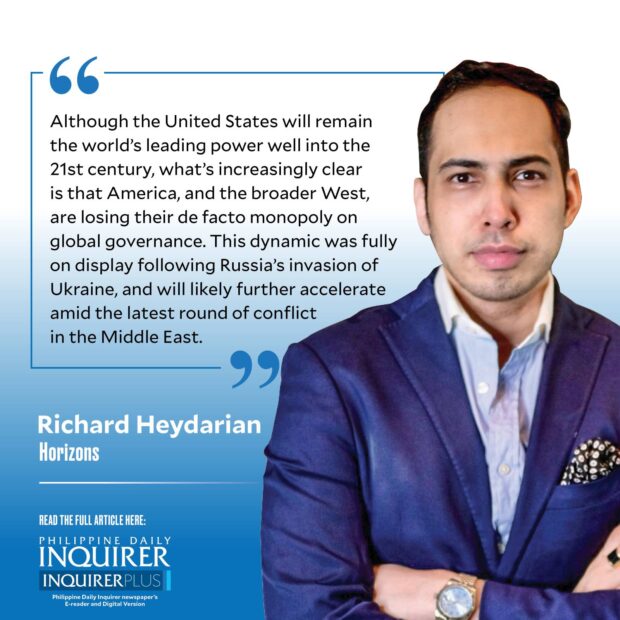Strategic rupture: The West vs the Global South
 We in Asia hypnotized ourselves into the belief that it could never by any possibility be otherwise, [yet] Japan rose from her dreams, and in giant strides left centuries of inaction behind, overtaking the present time in its foremost achievement,” wrote the great writer Rabindranath Tagore, reflecting on the Asian country’s remarkable success against European colonial forces, most notably Russia, at the turn of the 20th century.
We in Asia hypnotized ourselves into the belief that it could never by any possibility be otherwise, [yet] Japan rose from her dreams, and in giant strides left centuries of inaction behind, overtaking the present time in its foremost achievement,” wrote the great writer Rabindranath Tagore, reflecting on the Asian country’s remarkable success against European colonial forces, most notably Russia, at the turn of the 20th century.
“This has broken the spell under which we lay in torpor for ages, taking it to be the normal condition of certain races living in certain geographical limits,” Tagore continued. The immense psychological impact of the rise of Japan, and its historic defeat of Tsarist forces during the Battle of Tsushima (1905), was not lost on colonial governors in Asia.
Witnessing the explosion of anti-colonial fervor from Cairo and Istanbul to Teheran and New Delhi, Lord Curzon, viceroy of India, warned his patrons back in Europe that “the reverberations of that victory have gone like a thunderclap through the whispering galleries of the East.” The world was never the same again.
As Pankaj Mishra explained in “From the Ruins of Empire” (2012), modern Asia was effectively born out of a decades-long process, which began with the Philippines’ nationalist revolt against the Spanish Empire (hence Jose Rizal’s special place among Asian nationalists) and culminated with Japan’s successful transformation into a modern nation-state.
The emergence of the American colossus at the end of World War I, however, allowed the West to retain its global dominance until the end of the 20th century. But as I have argued in a recent Doha Debate episode, co-organized by the Foreign Policy magazine, what we are witnessing now is nothing short of the end of the so-called American Century.
Although the United States will remain the world’s leading power well into the 21st century, what’s increasingly clear is that America, and the broader West, are losing their de facto monopoly on global governance. This dynamic was fully on display following Russia’s invasion of Ukraine, and will likely further accelerate amid the latest round of conflict in the Middle East.
In fairness, both concepts of “West” and “Global South” can be, at times, misleading, thanks to the immense diversity of views and interests, especially in the developing world. Not to mention, are East Asian nations such as Japan “Western”? Or, check Ireland and Norway’s nuanced take on the recent conflict in the Middle East. Nevertheless, we saw a relatively coherent diplomatic, economic, and military response by all Western nations following Russia’s invasion of Ukraine.
In contrast, however, giant nations of India and China not only refuse to sign up to Western sanctions but even doubled down on their economic ties with Moscow. Meanwhile, post-colonial nations as varied as Indonesia, South Africa, and Brazil adopted a broadly neutral stance on the crisis, refusing to squarely side with the West against the Eurasian aggressor, which also happens to be a big source of food, fertilizers, and oil for developing nations. In the case of Vietnam, another rising Asian power, it even secretly pursued a multibillion arms deal with Russia just as it signed a “comprehensive strategic partnership” with the US.
The ongoing conflict in the Middle East, however, could end up exposing even deeper fault lines between the West, which has squarely stood by Israel, and much of the Global South, which has emphasized Palestinians’ human rights and their quest for self-determination. Sensing a strategic opportunity to win over post-colonial nations, especially Muslim-majority states, even Russia’s Vladimir Putin has, with no hint of irony, emphasized the importance of protecting Palestinian civilians’ lives amid Israel’s intensifying military operations in Gaza.
Many in the “Global South” wonder, when the West invokes its “rules-based order” mantra, exactly whose “rules” and which “order” are they referring to? After all, from devastating military interventions in Iraq and Libya to America’s shambolic withdrawal from Afghanistan just months before Russia’s invasion of Ukraine, countless folks in the post-colonial world have seen neither much respect for international law nor much of an actual “order” in our turbulent era. And with the Global South regaining its place of pride among the world’s biggest economies and militaries, expect growing tensions with and resistance to the West on a whole host of issues.
—————-
rheydarian@inquirer.com.ph




















